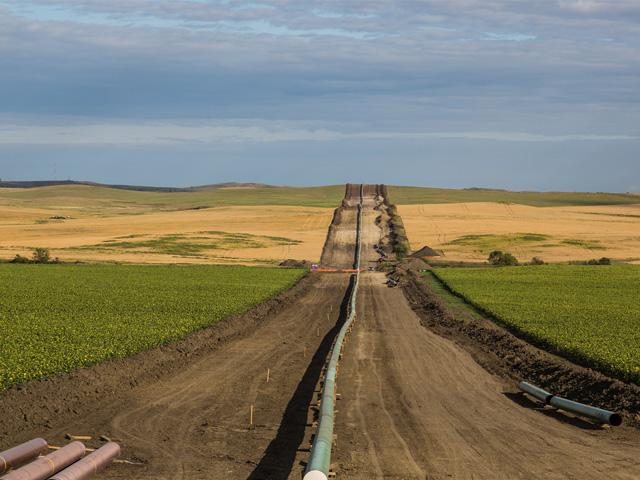Ag Fights for Dakota Access Pipeline
Agriculture Groups in Dakotas Raise Concerns About Higher Transport Costs
OMAHA (DTN) -- Saying the permanent shutdown of the Dakota Access pipeline (DAPL) would have devastating consequences for farmers, a number of agriculture groups in North Dakota and South Dakota this week waded into the legal waters of the controversial pipeline.
A district court this summer ordered the pipeline closed down as a result of permitting issues with the construction of the line dating back to 2017. On July 14, the U.S. Court of Appeals for the District of Columbia Circuit ruled the line could remain open pending an appeal. The court previously ordered the line closed and emptied by August.
Agriculture interest groups this week argued in an amicus brief filed in the appeals court that closing the pipeline will make it more costly for farmers to transport grain to market. (See DTN Contributing Analyst Elaine Kub's column on this topic here: https://www.dtnpf.com/… )
The North Dakota Farm Bureau, North Dakota Grain Dealers Association, North Dakota Grain Growers Association, South Dakota Corn Growers Association, South Dakota Farm Bureau Federation, and South Dakota Soybean Association asked the court to stay the district court ruling.
"Amici have an interest in the outcome of the court's decision, because a shutdown of DAPL would unduly burden the agricultural industry with increased transportation costs by forcing the agricultural industry to compete with the oil industry for railroad transportation to transport its commodities," the groups argued in the brief.
"In a time when farmers and ranchers are already facing financial stress, such increased transportation costs could have a crippling effect on the agricultural industry."
P[L1] D[0x0] M[300x250] OOP[F] ADUNIT[] T[]
From April 2016 to February 2017, Native American and other groups protested the construction of the pipeline running from the Bakken oil fields in western North Dakota and crossing the Missouri and Mississippi rivers to southern Illinois.
Part of the pipeline runs near the Standing Rock Indian Reservation. Protests centered on concerns about the pipeline's effect on water supplies used for irrigation, drinking water and threats to ancient burial grounds.
The appeals court ruled the U.S. Army Corps of Engineers violated environmental law in 2017 when it allowed the pipeline owner Energy Transfer to build beneath South Dakota Lake Oahe.
"A thriving agriculture industry is vital to the economies of North Dakota and South Dakota, and the agriculture industry's success relies heavily on the availability of rail service," the groups argued in the brief.
According to the groups, railroads transport 72% to 82% of North Dakota's crop output. "The total amount of crop rail shipments has vastly increased in recent history," the brief said. "Overall agricultural shipments by rail doubled between 2000 and 2014. The court should grant a stay because the DAPL shutdown would cause disruptive consequences to the agricultural industry."
The ag groups argue if the pipeline is no longer in operation, "the crude oil currently transported by DAPL would need to be shipped through alternate means. As the North Dakota Department of Transportation explained in its 2040 North Dakota State Rail Plan, there is a direct correlation between pipeline capacity and rail shipments of crude oil.
"As pipeline capacity increases, crude oil shipments by rail generally decline, since pipelines are a less expensive option for moving oil. Conversely, when pipeline capacity decreases, there would be a corresponding increase in the need for rail service to transport crude oil.
"Under these circumstances, a sudden shutdown of DAPL would drastically decrease the available pipeline capacity, thereby increasing the demand on rail service for transporting oil. Many farmers view pipelines such as DAPL as the long-term solution to ease rail congestion for the agriculture industry, and a shutdown of an active pipeline would give rise to the very problems the pipeline was meant to address."
A number of other economic and industry groups have filed similar briefs with the court.
That includes the North Dakota Water Users Association, the American Petroleum Institute and the Western Dakota Energy Association.
"Ultimately, the agriculture industry is already facing challenging times because of the current low crop prices," the ag groups argue.
"A DAPL shutdown would worsen the outlook for farmers, because it is likely to increase the costs of transporting grain due to the enhanced demand it would place on rail service."
Todd Neeley can be reached at todd.neeley@dtn.com
Follow him on Twitter @toddneeleyDTN
(c) Copyright 2020 DTN, LLC. All rights reserved.




